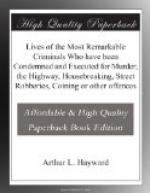First the Justice of Peace examines as carefully as he can into the nature of the offence, and the weight there is of evidence to persuade him of the just ground there is for accusing the person before him; and after he has thoroughly considered this, if the thing appear frivolous or ill-grounded, he may discharge the person, or if he think the circumstances strong enough to require it, he may take the bail of the party accused, or if the nature of the crime be more heinous, and the proof direct and clear, he is bound by an instrument under his hand and seal called a Mittimus, to commit the offender to safe custody until he is discharged according to Law. In carrying to prison for any crime whatsoever, if the party so carried escape himself, or if he be rescued by others, he and they are guilty of a very high misdemeanor, and in some cases, those who assist in making the rescue may be guilty of felony or high treason. But if a prisoner be once committed to gaol for felony, and afterwards break that prison and escape, such breach of prison is felony, by the Statute De Frangentibus Prisonam, and shall be tried for the same as in other cases of felony, and suffer on conviction. My readers will find mention made of a case of this nature in respect to one Roger Johnson, who some years ago was tried for breaking the prison of Newgate, while he remained a prisoner there under a charge of felony, and making his escape; but so tender is the English law that when there appeared a probability that one Fisher (not then taken) broke down the wall of the prison and that Johnson took advantage of that hole and made his escape, he was found not guilty, for want of due proof that he actually did break that hole through which he escaped.
The prisoner being in safe custody, a bill is next to be preferred to the grand jury of the county, in which the nature of the crime is properly set forth, and after hearing the evidence brought by the prosecutor to support the charge, they return the bill to the Court, marked Billa Vera or Ignoramus. In the first case the prisoner is required to be tried by the petit jury of twelve, and to abide their verdict; in case of the latter, he is to be discharged and freed from that prosecution. But the grand jury must find or not find the bill entire, for a Billa Vera to one part and an Ignoramus to another renders the whole proceeding void and is of the same use to the prisoner as if they had returned an Ignoramus upon the whole.




